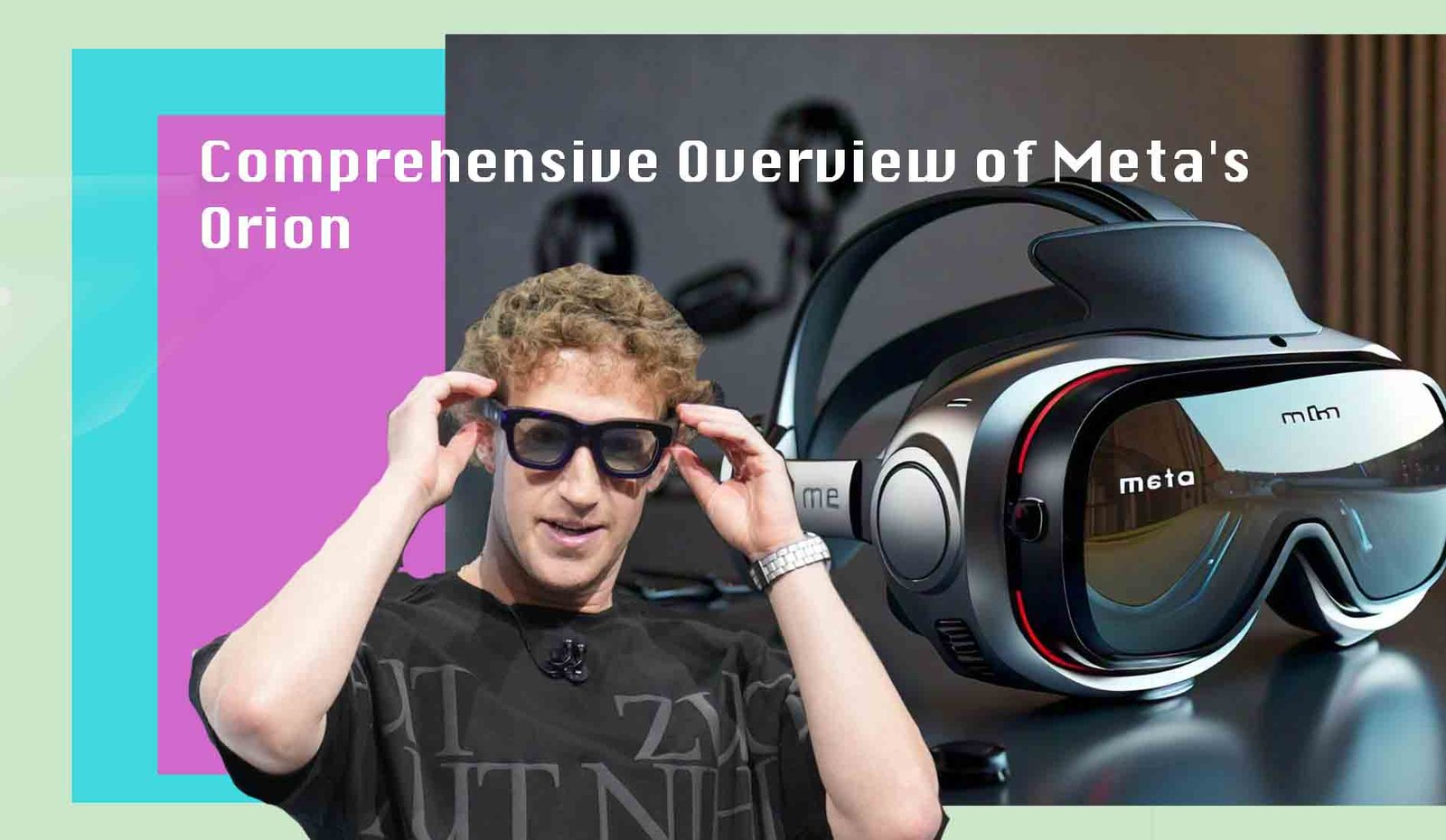On September 25, 2024, Meta took center stage at its highly anticipated annual Connect event, unveiling a series of groundbreaking products. These announcements further underscored the company’s commitment to pushing the boundaries of virtual reality (VR) and augmented reality (AR) technologies, cementing its position as a leader in the immersive tech space. The star of the event was undoubtedly the launch of the Meta Quest 3S, a more affordable, mixed-reality headset, but Meta also introduced the Orion smart glasses, which represent the future of AR integration. In addition to these hardware reveals, Meta also announced updates to existing products, making significant strides in accessibility, connectivity, and user experience.
This article offers a comprehensive examination of the key product launches, insights from Mark Zuckerberg’s keynote, future promises made by the company, and market reactions to Meta’s bold vision for the future of immersive technology.
Meta Quest 3S: Redefining Affordable Mixed Reality
The Meta Quest 3S is positioned as Meta’s latest innovation in the growing mixed-reality (MR) space. The device promises to combine cutting-edge features with affordability, effectively lowering the barrier to entry for consumers interested in immersive technology.
Additional Features
Controllers: The headset comes equipped with Touch Plus controllers featuring TruTouch haptics for enhanced tactile feedback, further improving user immersion. These controllers promise precise input responses, essential for gaming and immersive VR experiences.
Compatibility: The Meta Quest 3S supports the full library of existing Quest apps and games, including popular exclusives like Batman: Arkham Shadow. This backward compatibility ensures that users can access a wide variety of content right from launch.
Travel Mode: One of the most intriguing features is its Travel Mode, designed for users who want to experience VR on the go. Although primarily intended for stationary use, future updates will allow enhanced functionality on public transportation like trains, potentially expanding the use cases of the device in transit.
Orion Smart Glasses: A Glimpse into the Future of AR
Meta also took the opportunity to introduce the world to its Orion smart glasses, an exciting prototype that hints at the future of augmented reality integration in everyday life. These smart glasses are an ambitious leap toward merging the digital and physical worlds seamlessly.
Features:
Holographic AR Capabilities: The Orion smart glasses are designed to project interactive holographic content directly into the user’s environment. From overlaying virtual objects onto physical spaces to enabling dynamic real-time interactions with AR content, Orion aims to revolutionize how users interact with the world around them.
Neural Interface Technology: One of the standout features of Orion is its neural interface technology, which allows for brain signal communication with the device. Although still in the prototype phase, this groundbreaking development could eventually enable hands-free control, paving the way for a truly immersive and intuitive AR experience.
Meta’s vision for the Orion smart glasses aligns with its broader mission to create devices that enhance human connectivity by blending the digital and physical worlds. Although a consumer release date has not yet been announced, Meta’s commitment to refining the product before launch suggests that significant advancements will continue in the coming years.
Highlights from Mark Zuckerberg’s Speech
Mark Zuckerberg’s keynote address at Connect 2023 was filled with ambitious promises, technological insights, and a reaffirmation of Meta’s long-term vision. He touched on several key themes central to Meta’s future:
Vision for Connectivity:
Zuckerberg spoke passionately about Meta’s overarching mission to “build the future of human connections,” positioning Meta’s hardware and software innovations as tools for deepening human relationships, no matter the physical distance.
Product Development Approach: He defended Meta’s strategy of rapid product iteration, emphasizing the importance of “learning by doing.” This stands in contrast to competitors like Apple, which often take a more conservative, perfectionist approach. According to Zuckerberg, faster iterations allow Meta to stay agile and quickly adapt to the needs of its users, ultimately leading to more innovative breakthroughs.
Commitment to AI and AR: Zuckerberg also emphasized the role of artificial intelligence (AI) in shaping future Meta products. He revealed that nearly 500 million users engage with Meta’s AI features monthly, signaling the technology’s growing importance in user experiences across Meta’s platforms. He reaffirmed Meta’s commitment to enhancing AI-driven features in all its products, from the Quest 3S to Orion smart glasses.
Future Promises:
In addition to product announcements, Zuckerberg made several forward-looking commitments during his keynote speech:
AI-Driven User Experiences: Meta will continue to invest heavily in AI technologies, with the goal of making interactions across all platforms more intuitive, personalized, and accessible to users.
Orion Smart Glasses Development: Zuckerberg assured that Meta will refine the Orion smart glasses prototype based on user feedback, with plans to release them as a consumer product only when they have achieved the highest standards of usability and comfort.
Expansion of Enterprise Applications: Meta plans to further extend its enterprise-focused solutions, particularly through partnerships with major tech companies like Microsoft. These collaborations will focus on optimizing AR and VR for business applications, positioning Meta as a key player in the growing enterprise metaverse sector.
Key Takeaway Points:
Orion is the most advanced AR glasses the world has ever seen. It has a wide field of view, holographic displays, and is bright enough to see in different lighting conditions. It is also less than 100 grams and has a small puck that goes with it to help power the whole thing.
Orion is different from every other screen that you have ever used. It is not actually a screen, but a completely new kind of display architecture with tiny projectors that shoot light into waveguides.
You can interact with Orion using voice, hand tracking, and eye tracking. You can also use a neural interface to send signals from your brain to the device.
Orion is still in development, but Zuckerberg is confident that it will be a consumer product soon. He is working on making the display sharper, the design smaller and more fashionable, and the manufacturing more affordable.
Zuckerberg believes that Orion is a glimpse of a future where AR glasses will be a major computing platform. He believes that they will deliver a deep sense of presence and allow people to connect with each other in new ways.
Market Reaction and Competitive Landscape
The market responded positively to Meta’s announcements, particularly the aggressive pricing of the Quest 3S, which is significantly lower than competitors such as Apple’s Vision Pro, priced at a hefty $3,499. The Quest 3S offers a competitive advantage not only in price but also in its feature set, making advanced mixed-reality experiences accessible to a wider audience.
Despite the positive buzz, Meta’s financials remain a point of concern. The company has reported substantial losses in its Reality Labs division, exceeding $8 billion in just the first half of the year. However, Zuckerberg’s long-term vision for innovation and Meta’s leadership in VR have reassured investors about the company’s strategic direction. While Meta leads in terms of hardware adoption, it has yet to create a mainstream cultural phenomenon or the kind of vibrant developer ecosystem seen around smartphones or PCs.
Meta’s Connect 2023 event marked a significant step forward in making VR and AR technologies more accessible to consumers. With the Meta Quest 3S positioned as an affordable entry point into mixed reality and the ambitious Orion smart glasses hinting at the future of AR, Meta is clearly intent on maintaining its leadership in this fast-evolving market. However, the success of these products will depend not just on their technical merits but on how effectively they resonate with users who seek rich, immersive experiences.
Meta’s commitment to rapid iteration, coupled with its focus on AI-driven innovation, positions the company well in an increasingly competitive landscape. All eyes are now on Meta as these products hit the market and users determine whether they live up to the promise of connecting our digital and physical worlds in meaningful ways.
Key Specifications
- Price:
- $299.99 for the 128GB model
- $399.99 for the 256GB model
- Launch Date:
- Pre-orders started on September 25, with official deliveries scheduled to begin on October 15.
- Display:
- Equipped with 4K+ Infinite displays, offering a crystal-clear resolution of 2064×2208 pixels per eye. The pancake lenses improve visual clarity and reduce distortion, offering a more immersive and comfortable experience for users, especially during long sessions.
- Processor:
- Powered by the Snapdragon XR2 Gen 2 chipset, ensuring smooth performance even in complex, graphics-heavy applications.
- Memory:
- Comes with 8GB of RAM, which balances performance and multitasking capabilities, making it ideal for gaming, work, and mixed-reality experiences.
- Operating System:
- Runs on the Meta Horizon OS, optimized for spatial computing—enabling seamless integration between physical and digital spaces.
- Audio:
- Features Dolby Atmos support with enhanced spatial audio capabilities, providing users with a deeply immersive audio experience that complements the visual immersion.
- Passthrough Capability:
- The device supports full-color passthrough, allowing users to interact with both their virtual and physical environments without removing the headset—perfect for mixed-reality applications where immersion and awareness must coexist.
- Field of View:
- Offers a wider field of view compared to previous models, expanding peripheral vision and creating a more realistic and immersive visual experience.
- Battery Life:
- Approximately 2.5 hours of average usage, which is slightly below some competitors but in line with Meta’s efforts to maintain a balance between performance and portability.
X-Handle
check out some of our favorite demos from yesterday #MetaConnect pic.twitter.com/CkeZZ8EJeL
— Meta (@Meta) September 26, 2024




